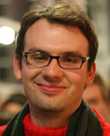Two faculty receive Presidential Early Career Awards
By Anne Ju


Greg Fuchs, assistant professor of applied and engineering physics, and Noah Snavely, assistant professor of computer science, are among 102 winners this year of the Presidential Early Career Awards for Scientists and Engineers (PECASE), the highest honor bestowed by the U.S. government on early career scientists and engineers.
Fuchs, who was nominated through the Air Force Office of Scientific Research, is developing table-top time- and space-resolved magnetic imaging on scales fundamental to magnetism. For typical ferromagnetic metals, the scale is roughly 50 nanometers for space and tenths of picoseconds for time. Fuchs will then apply these techniques to the study of nanoscale magnetic systems and devices, some of which could be used in future technologies such as nonvolatile memory and signal processing.
“The diffraction limit for visible light limits focusing resolution to no smaller than about 200 nanometers, so the challenge is to find a way to sneak around that obstacle,” Fuchs said.
Snavely, nominated through the National Science Foundation, is working on new computational tools for extracting information from the hundreds of millions of photos shared online every day on sites like Flickr and Facebook. Collectively, these photos can reveal rich information about our world, Snavely said, but they are also inherently unstructured, captured by millions of people from different viewpoints, times, weather conditions and cameras.
“Our work at Cornell is on creating new computer vision algorithms for calibrating and understanding these photos, toward the goal of treating these photos as just another sensor for scientific and engineering applications,” Snavely said.
PECASE awards are coordinated by the Office of Science and Technology Policy within the Executive Office of the President. Winners are selected for their pursuit of innovative research at the frontiers of science and technology and their commitment to community service as demonstrated through scientific leadership, public education or community outreach.
Media Contact
Get Cornell news delivered right to your inbox.
Subscribe